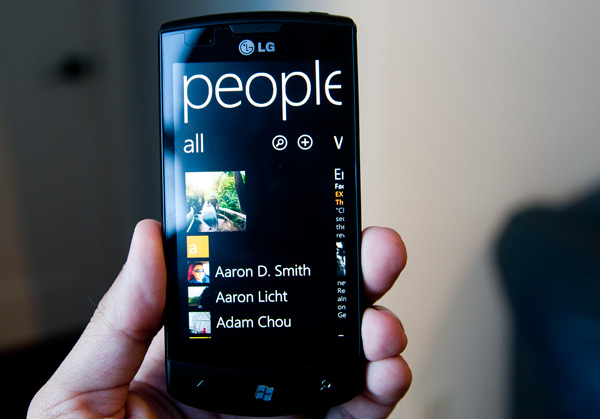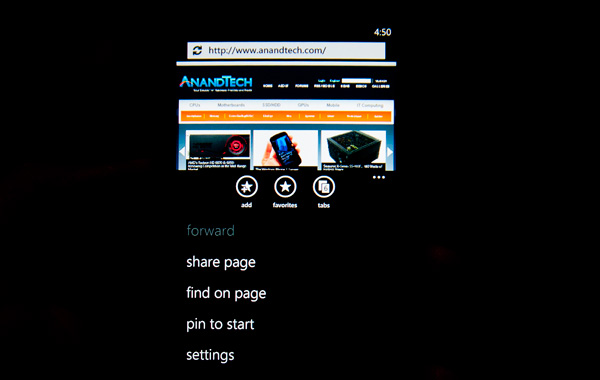LG's Optimus 7 & Samsung's Focus Reviewed: A Tale of Two Windows Phones
by Anand Lal Shimpi on December 3, 2010 10:14 PM EST- Posted in
- Smartphones
- Samsung
- Windows Phone 7
- LG Optimus
- LG
- Samsung Focus
- Mobile
The Screen, oh the Screen
With Android I found that larger screen devices made up for the shortcomings in the default Android keyboard. It's a big part of why I liked phones like the EVO and Droid X. Smaller handsets like the Nexus One were just harder to type on.
With Windows Phones, the exact opposite is true. The larger the phone, the harder it is to type fast on - at least for me. I make more mistakes on the Focus' 4-inch screen compared to the Optimus 7's 3.8-inch screen. I can type well on both, I'm just faster on the Optimus. If you have larger hands than me I can see the Focus being perfect.
Screen size is obviously just one part of the equation. While I believe LG wins there, Samsung easily takes the quality crown. The Focus uses the same Super AMOLED technology we talked about in the Epic 4G and Fascinate reviews. Super AMOLED layers the touch sensor directly on the AMOLED display, reducing glare significantly and moving the display closer to the face of the smartphone. You don't really notice the latter until you compare it with a standard AMOLED or LCD screen like LG's, but once you do it's a big difference.


The biggest advantage the Focus has is in contrast ratio. AMOLED displays are truly off when displaying black, so you technically get infinite contrast ratio. Combined with Windows Phone 7's vibrant theme colors you get a phone that's extremely eye catching. While you don't get the pixel density of the iPhone 4, the display is arguably better to look at in my opinion thanks to the contrast ratio. Everything just pops.
Even visibility outdoors is improved thanks to the close layering of the touch sensor and AMOLED panel. Unfortunately the Focus doesn't get very bright so you have to keep the phone at full brightness for it to be useful in the sun.

LG on the other hand falls short in the display department. The TN panel used in the Optimus 7 feels dated by comparison. Colors aren't vibrant, the contrast ratio is sub par and viewing angles are terrible. If you're not looking directly at the phone blacks will appear grey and at extreme angles there's a lot of color shift. Usually when you're using your phone you are staring directly at it, but the poor LCD quality is noticeable if you've got the LG on your desk for example.

Samsung Focus (left) vs. LG Optimus 7 (right), note the poor viewing angle of the Optimus
I have no complaints about the Optimus 7's build quality or screen size, in fact in those two areas LG is ahead of the pack, but the LCD is a disappointment.












34 Comments
View All Comments
omega12 - Friday, December 3, 2010 - link
"Apple is the first company I've seen to take the pace of innovation offered by Moore's Law and pair it with an equally aggressive expected upgrade cycle."Last time i checked their hardware was not exactly up to date so I don't think you can say they are the kind that follows Moore's Law closely. Aggressive upgrade cycle they do have though.
Maybe you meant that with each upgrade they usually change their core hardware? But then again that's hardly the case. I don't get it.
sprockkets - Friday, December 3, 2010 - link
I think Moore and his law need to die. This isn't even cpus we are talking about, and Anand even referenced the stupid law when referring to SSDs.For that matter, if they really were following Moore's law they would upgrade like every 18 months, not 12, and others upgrade like every 6 months. And those ARM cpus are not getting upgrades solely based on litho process improvements either.
foolsgambit11 - Monday, December 6, 2010 - link
Moore's Law is often used a simple shorthand for referring to the rapid pace of technological innovation, and that's how it was used here. But given that, Moore's Law originally only said that the number of transistors that can be fit on a given size of silicon will double roughly every 18-24 months (Moore used different numbers at different times). So it applies equally well to SSDs.Anand Lal Shimpi - Friday, December 3, 2010 - link
I meant from an end user standpoint. The typical PC upgrade cycle is 3 - 5 years, Apple's sales strategy seems to be to shorten that cycle fairly aggressively.The holy grail a decade ago was selling PCs like cars - a new one every model year. Apple has effectively done that. It's great for Apple's bottom line for sure.
Take care,
Anand
StormyParis - Saturday, December 4, 2010 - link
Indeed, the car model-year explanation makes a lot more sense. People like getting stuff that is "new", it's an easy-to-grok upgrade cycle, and, thanks to technological progress, PC model-years mean more than cosmetics changes, which are what most car model-years are about.I'm wondering why most brands don't go with the yearly line-up refresh, probably towards the end of summer. I'm guessing PC companies still mainly see themselves as tech-driven, or even component-driven, which kinda explains why Apple is making a killing.
Pirks - Sunday, December 5, 2010 - link
"why most brands don't go with the yearly line-up refresh, probably towards the end of summer"That's because most brands are run by the Mototrolls and frobitches of the world.
wyvernknight - Monday, December 6, 2010 - link
Wow, its pirks, the persistent apple-lover from dailytech. Long time since i read one of your comments!Exelius - Monday, December 6, 2010 - link
Apple's hardware was pretty up to date when it was released; which was quite a while ago. The trick for Apple is that they underclock everything to achieve excellent battery life.Mobile hardware goes out of date pretty quickly; but I still wouldn't say the iPhone 4 is exactly ancient. They release one hardware upgrade and several software upgrades per year.
If you mean stuff other than the iPhone, then sure. But I'm not really sure they need to be the latest-and-greatest; the MBP is still easily the best selling laptop in the world and when you compare the MBP to truly comparable laptops, it's not poorly priced. Try to find a laptop with high-res, quality 15" screen, discrete switchable GPU, i5 or i7 and 5+ hours battery life... The entire package is what's important.
It's almost to Apple's advantage to sell slightly out-of-date components, so you buy a new one every year... Compare this with a company like Dell, HP or Acer where they release a new product every week, so the end-users know that whenever they want to upgrade, there will be a new product there for them to buy. With Apple, you try to time your purchase right after a major announcement.
mfenn - Friday, December 3, 2010 - link
The Youtube video on page 9 is marked as private. :(tipoo - Saturday, December 4, 2010 - link
Works fine for me, but not in the embedded player. You have to double click it to open it in youtube.